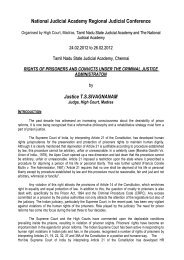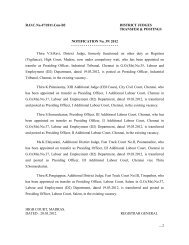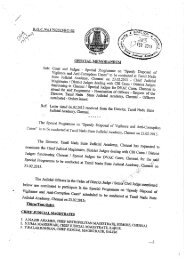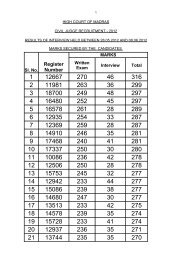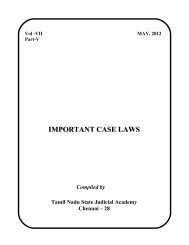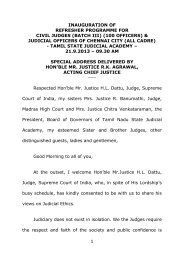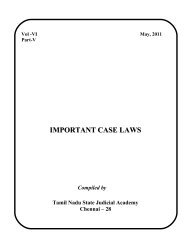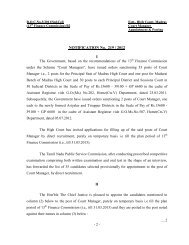Appreciation of Evidence in Sessions Cases - Justice D.Murugesan
Appreciation of Evidence in Sessions Cases - Justice D.Murugesan
Appreciation of Evidence in Sessions Cases - Justice D.Murugesan
You also want an ePaper? Increase the reach of your titles
YUMPU automatically turns print PDFs into web optimized ePapers that Google loves.
the weapons, if any, used, as also the names <strong>of</strong> the eyewitnesses, if any. Delay <strong>in</strong> lodg<strong>in</strong>g the FIR<br />
<strong>of</strong>ten results <strong>in</strong> embellishment, which is a creature <strong>of</strong> an afterthought. On account <strong>of</strong> delay, the FIR<br />
not only gets bereft <strong>of</strong> the advantage <strong>of</strong> spontaneity, danger also creeps <strong>in</strong> <strong>of</strong> the <strong>in</strong>troduction <strong>of</strong> a<br />
coloured version or exaggerated story. With a view to determ<strong>in</strong>e whether the FIR was lodged at the<br />
time it is alleged to have been recorded, the courts generally look for certa<strong>in</strong> external checks. One<br />
<strong>of</strong> the checks is the receipt <strong>of</strong> the copy <strong>of</strong> the FIR, called a special report <strong>in</strong> a murder case, by the<br />
local Magistrate. If this report is received by the Magistrate late it can give rise to an <strong>in</strong>ference that<br />
the FIR was not lodged at the time it is alleged to have been recorded, unless, <strong>of</strong> course the<br />
prosecution can <strong>of</strong>fer a satisfactory explanation for the delay <strong>in</strong> despatch<strong>in</strong>g or receipt <strong>of</strong> the copy <strong>of</strong><br />
the FIR by the local Magistrate. …. The second external check equally important is the send<strong>in</strong>g <strong>of</strong><br />
the copy <strong>of</strong> the FIR along with the dead body and its reference <strong>in</strong> the <strong>in</strong>quest report. Even though<br />
the <strong>in</strong>quest report, prepared under Section 174 CrPC, is aimed at serv<strong>in</strong>g a statutory function, to<br />
lend credence to the prosecution case, the details <strong>of</strong> the FIR and the gist <strong>of</strong> statements recorded<br />
dur<strong>in</strong>g <strong>in</strong>quest proceed<strong>in</strong>gs get reflected <strong>in</strong> the report. The absence <strong>of</strong> those details is <strong>in</strong>dicative <strong>of</strong><br />
the fact that the prosecution story was still <strong>in</strong> embryo and had not been given any shape and that<br />
the FIR came to be recorded later on after due deliberations and consultations and was then antetimed<br />
to give it the colour <strong>of</strong> a promptly lodged FIR. ….”<br />
The Hon’ble Apex Court <strong>in</strong> State <strong>of</strong> H.P. V. Gian Chand (2001) 6 SCC 71 has held that,<br />
“12. Delay <strong>in</strong> lodg<strong>in</strong>g the FIR cannot be used as a ritualistic formula for doubt<strong>in</strong>g the prosecution<br />
case and discard<strong>in</strong>g the same solely on the ground <strong>of</strong> delay <strong>in</strong> lodg<strong>in</strong>g the first <strong>in</strong>formation report.<br />
Delay has the effect <strong>of</strong> putt<strong>in</strong>g the court <strong>in</strong> its guard to search if any explanation has been <strong>of</strong>fered for<br />
the delay, and if <strong>of</strong>fered, whether it is satisfactory or not. If the prosecution fails to satisfactorily<br />
expla<strong>in</strong> the delay and there is a possibility <strong>of</strong> embellishment <strong>in</strong> the prosecution version on account <strong>of</strong><br />
such delay, the delay would be fatal to the prosecution. However, if the delay is expla<strong>in</strong>ed to the<br />
satisfaction <strong>of</strong> the court, the delay cannot by itself be a ground for disbeliev<strong>in</strong>g and discard<strong>in</strong>g the<br />
entire prosecution case.”<br />
The Hon’ble Apex Court <strong>in</strong> Dilawar S<strong>in</strong>gh V. State <strong>of</strong> Delhi reported <strong>in</strong> 2007 (12) SCC 641<br />
has held that,<br />
“9. In crim<strong>in</strong>al trial one <strong>of</strong> the card<strong>in</strong>al pr<strong>in</strong>ciples for the Court is to look for plausible explanation<br />
for the delay <strong>in</strong> lodg<strong>in</strong>g the report. Delay sometimes affords opportunity to the compla<strong>in</strong>ant to<br />
make deliberation upon the compla<strong>in</strong>t and to make embellishment or even make fabrications.<br />
Delay defeats the chance <strong>of</strong> the unsoiled and untarnished version <strong>of</strong> the case to be presented<br />
before the court at the earliest <strong>in</strong>stance. That is why if there is delay <strong>in</strong> either com<strong>in</strong>g before the<br />
police or before the court, the courts always view the allegations with suspicion and look for<br />
satisfactory explanation. If no such satisfaction is formed, the delay is treated as fatal to the<br />
prosecution case.”<br />
Delay <strong>in</strong> lodg<strong>in</strong>g first <strong>in</strong>formation report cannot be used as a ritualistic formula for doubt<strong>in</strong>g a<br />
case Silak Ram v. State <strong>of</strong> Haryana, AIR 2007 SC 2739. To the same effect there is another case<br />
Gourishankara Swamigala v. State <strong>of</strong> Karnataka, AIR 2008 SC 2349.<br />
5



